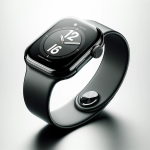As the tech industry eagerly anticipates the next move from one of its giants, reports emerge suggesting that Samsung may soon introduce a successor to the Galaxy Watch 4. Instead of a direct sequel, this new wearable device might debut under an entirely new name, indicating a possible strategic shift in branding or features. Consumers and industry experts alike are on the lookout for official announcements that could reveal the direction Samsung is taking with its wearable technology.
The landscape of smartwatch releases by Samsung reveals a pattern of continuous innovation and rebranding efforts. Historically, the company has used the Galaxy moniker for its range of devices, but there have been instances where Samsung diverged from this tradition, such as with the Samsung Gear series. These precedents suggest a willingness to evolve branding strategies to better align with the feature sets and market positioning of their products. With the success of the Galaxy Watch series, any name change would signal a significant update in design or functionality that could set a new course for the company’s offerings in the smartwatch market.
Speculations Around the New Naming Convention
The rebranding rumors have sparked various speculations. Some theorize that the new name could reflect advanced features or a new design philosophy. Others wonder if this change might align with a bigger ecosystem or software overhaul, potentially integrating with Samsung’s broader range of smart devices and services. The new name might also reflect a strategic attempt to capture a larger market share by differentiating the product in an increasingly crowded wearable space.
Comparative Insights From the Smartwatch Industry
Looking beyond Samsung’s walls, the smartwatch industry remains vibrant and competitive. A recent article from “Engadget” titled “Fitbit’s newest smartwatch aims to undercut Apple Watch” discusses how Fitbit is positioning its products as affordable alternatives to the Apple Watch, suggesting targeted market segments and the importance of pricing strategies. Another article from “The Verge,” “Google’s Wear OS 3 plans for 2022 could give smartwatches a much-needed jolt,” highlights upcoming updates to Google’s Wear OS platform, which could impact Samsung’s software choices for its new smartwatch, especially given their collaboration on the Galaxy Watch 4.
Emerging Trends in Wearable Technology
In the broader context, the wearable tech sector is witnessing an evolution toward holistic health management and tighter ecosystem integration. Companies are not only improving traditional health monitoring features but also incorporating new functionalities like stress management and sleep tracking. This innovation trajectory shapes expectations for Samsung’s forthcoming product, with potential buyers looking for a gadget that keeps pace with or outperforms competing offerings.
Useful Points
- New name may signify feature upgrades or design changes.
- Integration with Samsung’s ecosystem could be a focus.
- Competitive pricing and health features are key trends.
The anticipation for Samsung’s next smartwatch iteration is building, with the potential new naming convention adding to the intrigue. If the rumors hold true, this device could mark a pivotal moment for Samsung, as it strives to redefine its place in the smartwatch hierarchy. The success of this launch will depend on how well the new features and branding resonate with consumers who are increasingly looking for devices that offer a blend of innovation, health-conscious technology, and seamless integration with their digital lives.










